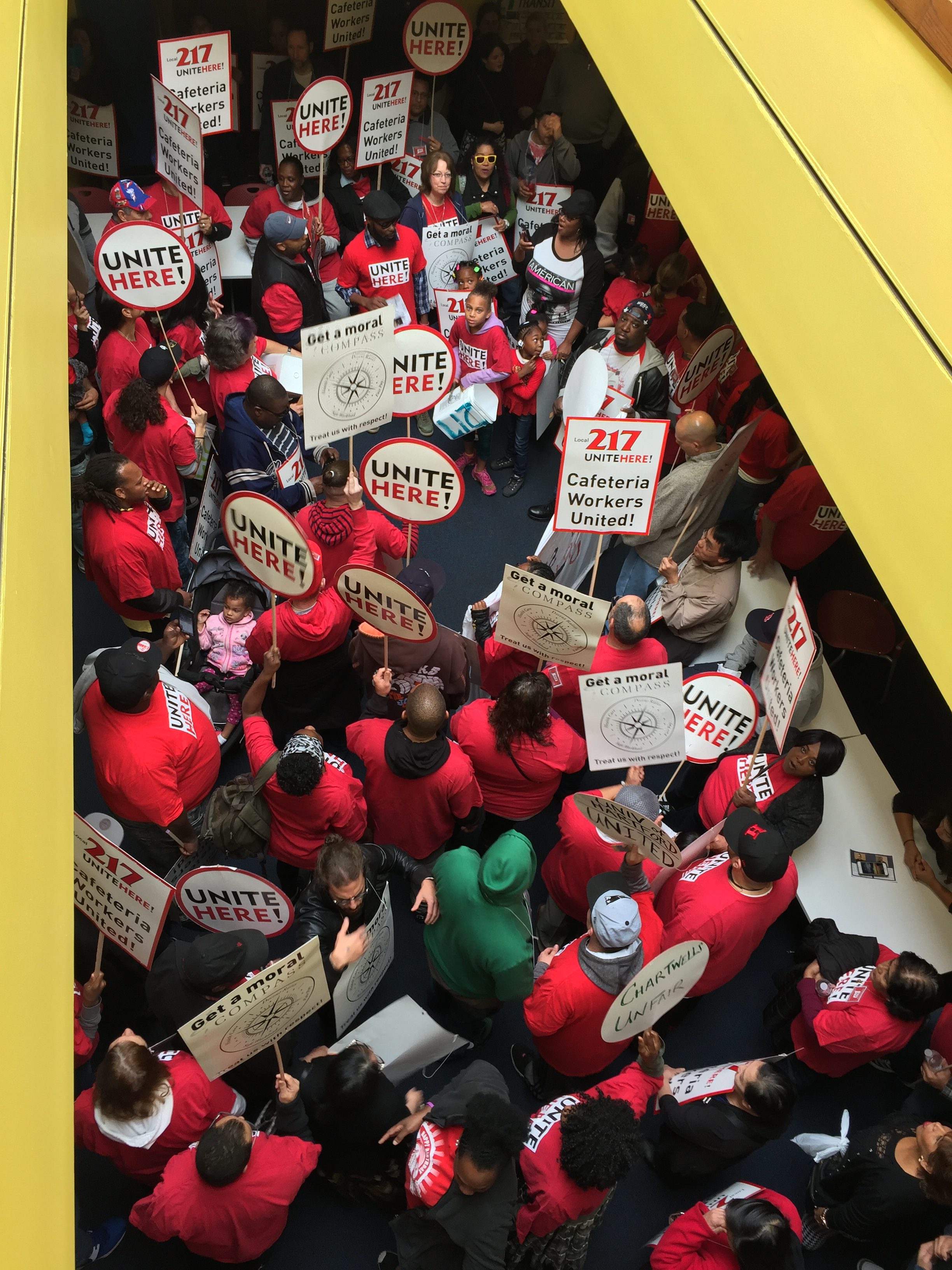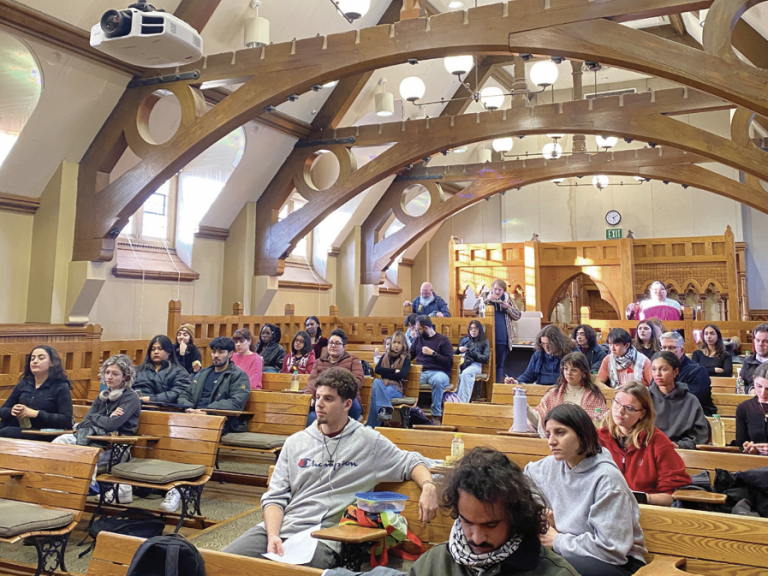By Chris Bulfinch ’18 and Max Furigay ’19
News Editors
“My health care is not ‘wasteful’ or ‘excessive,’” reads a pin attached to a number of Chartwells employees’ uniforms this week. Signs in the hands of picketers implored Chartwells to “Get a moral Compass,” while employees protested inside Mather Hall on Oct. 8. These slogans are the result of an ongoing dispute between Trinity’s food service staff and Chartwells, Trinity’s food service provider.
After the expiration of their contract over the summer, Trinity’s employees were dismayed to find provisions in the new contract stipulating reductions in hours and a decrease in health care coverage. Working with their union, UNITE HERE 217, Trinity food service employees collaborated with Chartwells employees from a number of other colleges and universities across Connecticut to protest.
The rally took place on Saturday Oct. 8, 2016 at 11:15 a.m. The Trinity protesters were joined by over 200 other employees from other colleges including Eastern Connecticut State University, University of Hartford, Western Connecticut State University, and Coast Guard Academy. The protest was directed towards the three major college food service providers in Connecticut: Chartwells, Sodexo, and Aramark. The workers allege that Chartwells is stiffing employees while turning a large profit: “Chartwells is [taking advantage of] you guys,” accused an employee who wished to remain anonymous. “How many meals do you have left over each week? They overcharge you guys and underpay us, and make money both ways.”
The rally began outside near Mather Circle and proceeded into Mather Dining Hall, where protesters chanted and waved signs in the lobby. Campus Safety officers showed up but no action was taken to disrupt the rally.
The new contract with Chartwells, which entailed reductions in health care coverage, sparked the demonstration on Saturday. The precipitous increases in the cost of health care have forced the Local 217 workers to be increasingly creative in finding ways to keep employer-covered health care feasible. Beginning in 2012, the union’s health and welfare funds were diverted towards efforts to alleviate the costs of health care. According to Connie Holt, a Local 217 spokesperson, this method has saved Chartwell’s hundreds of thousands of dollars, due to the union’s economical, nonprofit funding structure.
“I am a single mom supporting eight children and Chartwells is trying to cut my hours, make me pay for my own health insurance; there is no way that I can support my family with what they want to pay me,” explained a Chartwells employee that has worked for the company for over 20 years.
“If Trinity students care about the Hartford community, they will care about us and this issue because we are the community,” stated Trinity UNITE HERE 217 spokesperson Jose Villegas. “We are all from Hartford.” Chartwells administrators unilaterally declined to comment for this story.
Chartwells is the world’s largest food service company; the net income of the British business in 2015 was £877 million, roughly equivalent to $1.06 billion. It is a part of the Compass Group, a collection of the largest food service companies in the world, with Sodexo and Aramark among its members. These companies have relationships with many colleges and universities across the country.
UNITE HERE is a national union for food service and hospitality workers. Local 217’s website explains that the union includes workers from the “hospitality, gaming, food service, manufacturing, textile, distribution, laundry, transportation, and airport industries.” Local 217 represents 850 service workers on nine different campuses across Connecticut.
Trinity’s Dining Services’ website states that “[the] Compass Group rewards employee dedication, consistent achievement and leadership through a compensation package and opportunity for personal career advancement within the organization.” Potential employees are offered “Full Time Career Opportunities,” and a “Comprehensive Benefits Plan.”
The proposal coming from Chartwells involves offering pay raises while simultaneously making workers take health insurance that is no longer entirely employer supported. Standards established decades ago by UNITE HERE 217 stipulate that all 850 Connecticut union members will receive, in the words of Holt, “100 percent employer paid, quality health insurance.” Under the terms of the new contract, workers would have to cover 10 percent of their health care costs monthly. Early in the negotiations, the head of labor relations for Chartwells apparently referred to the employees’ total healthcare coverage as “wasteful and excessive.”
The insurance plan provided by Chartwells to employees until June 2016 qualified as a “Platinum Plus” plan, as defined in the language of the Affordable Care Act’s Healthcare Exchange. The new proposal put forward by Chartwells qualifies as a Platinum plan. True to Holt’s characterization, a Platinum plan covers 90 percent of medical expenses, though the numbers certainly fluctuate to some degree between individual circumstances. This puts the on us of the last 10 percent on the employees themselves.
The pay raises, likely intended to compensate the workers for their increased health care costs, were accompanied by widespread cuts to the number of working hours offered to employees.
Villegas, a longtime Chartwells employee at Trinity, describes a process where a cycle of “new schedule after new schedule” gradually reduces employees’ hours. For example, according to Villegas, this semester only 60 percent of the workers retained the same number of hours that they had last year.
Diana St. Marks, an employee at the University of Hartford, shared that of 110 unionized workers in their dining services, only eight of them have 38 or more hours per week.
Trinity’s administration, like the administrations at other colleges involved in such disputes, takes a neutral position in contract. President Berger-Sweeney expressed her “[appreciation of] the work of the professional members of our food service staff as well as our partnership with Chartwells,” while acknowledging that “we respect the collective bargaining rights of Chartwells employees and their right to organize and protest.”
“The College does not participate in contract negotiations,” says Dan Hitchell, Trinity’s Chief Financial Officer and Vice President of Finance, elaborating that “dining services provided by Chartwells and its employees are an important and valued aspect of campus life at Trinity,” and that “we look forward to their negotiations being completed quickly.” Interim Director of Communications Kathy Andrews echoed this statement, saying “we want everyone who works at the College to be compensated for their time and talents. The responsihlity for agreeing on a contract is between Chartwells and the workers.”
Jose Sanchez, a Chartwells employee for 24 years, expressed his dissatisfaction with the College’s neutrality: “I disagree with that totally. My opinion is this: this is your house. If you’re going to shut down a portion of the cafeteria, it needs to be approved, it must’ve gotten to their desk. Chartwells, Aramark, or Sodexo, they’re not going to do anything without your okay. Don’t tell me that if you shut down that building that you don’t know anything about that. This is your campus.”
Food Service Workers Unite to Protest Chartwells







+ There are no comments
Add yours